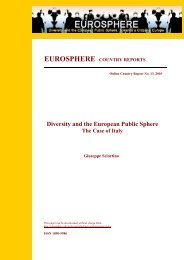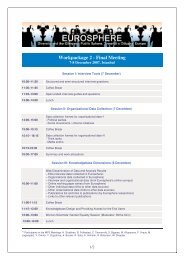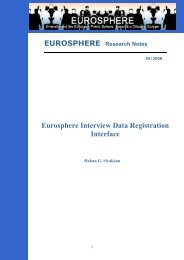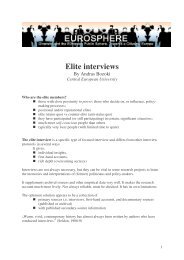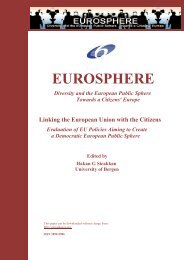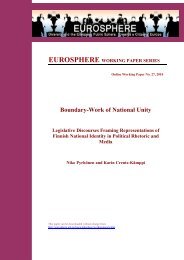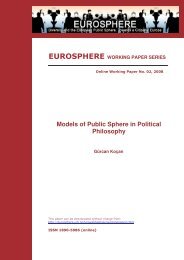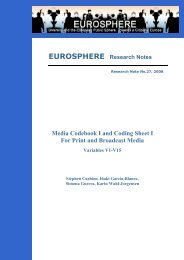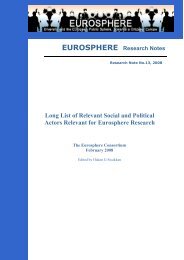Migrants, Minorities, Belongings and Citizenship. Glocalization and ...
Migrants, Minorities, Belongings and Citizenship. Glocalization and ...
Migrants, Minorities, Belongings and Citizenship. Glocalization and ...
Create successful ePaper yourself
Turn your PDF publications into a flip-book with our unique Google optimized e-Paper software.
findings could only include certain illustrative examples of the obtained results, as<br />
follows:<br />
● High degrees of political belonging – i.e. defining oneself primarily as a political<br />
being <strong>and</strong>/or finding the meaning of public life in being part of a political party,<br />
movement, or ideology is closely associated with high degrees of alignment in<br />
national <strong>and</strong> essentialized public spaces.<br />
● High mobility of mind between different references of identification is tightly<br />
associated with high degrees of misalignment in national <strong>and</strong> essentialized public<br />
spaces. On the other h<strong>and</strong>, high mobility of mind is closely associated with high<br />
degrees of alignment in glocal spaces – i.e. contexts of deep diversity.<br />
● High mobility of mind is tightly associated with high spatial mobility on the one<br />
h<strong>and</strong>, <strong>and</strong> on the other h<strong>and</strong>, with high level of attendance to glocal spaces – i.e.<br />
contexts of deep diversity.<br />
● Mobility of mind is also an important factor shaping different belonging patterns.<br />
The predictors of (mis)alignments can at the first sight be perceived as significant factors<br />
that can be used to reduce/eliminate the misalignments between citizens’ preferences<br />
<strong>and</strong> the different public spaces’ ability to respond. However, as delineated in the<br />
following sections of this report, we also found that manipulating any one of these factors<br />
will result in elimination/reduction in one type of misalignment; <strong>and</strong> at the same time, it<br />
will result in intensification/reification of (an)other type(s) of misalignment.<br />
Glocalmig is an exploratory project, <strong>and</strong> its results are derived from very small samples<br />
from glocal sites in six European countries. The results should be regarded as a<br />
scientifically well-justified theory – a legitimate <strong>and</strong> alternative set of hypotheses – which<br />
should be investigated <strong>and</strong> tested further on a broader European basis.<br />
3. Policy implications of the Glocalmig results<br />
Provided that the Glocalmig findings prove valid in the future through comprehensive<br />
qualitative <strong>and</strong> quantitative research in Europe proper, it will be fruitful both for the<br />
European Union <strong>and</strong> for these individuals that the Union encourage the further<br />
development of glocal spaces <strong>and</strong> the diversity mode of being that is being created in<br />
these sites. This may, on the one h<strong>and</strong>, help these individuals to feel more included, <strong>and</strong><br />
on the other h<strong>and</strong>, provide legitimacy to the European Union amongst these groups.<br />
17



